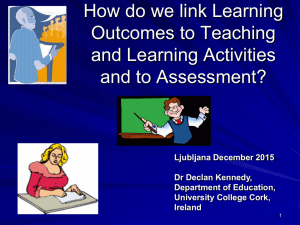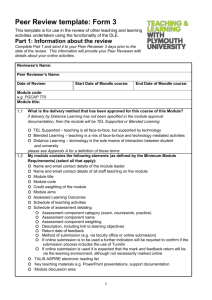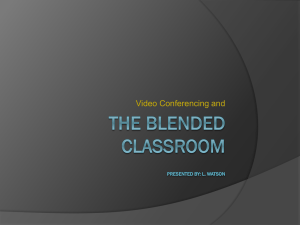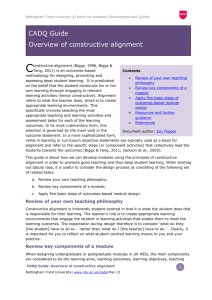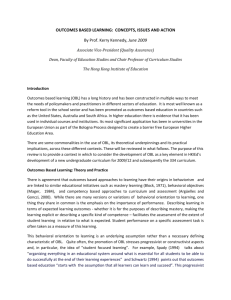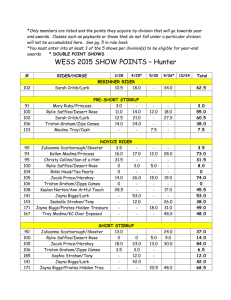Designing_and_Delivering_an_online_module_Angela_Short
advertisement
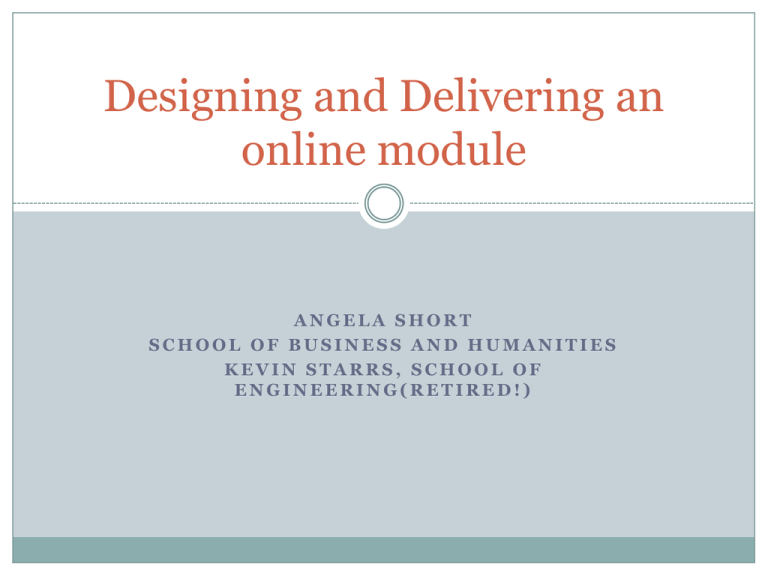
Designing and Delivering an online module ANGELA SHORT SCHOOL OF BUSINESS AND HUMANITIES KEVIN STARRS, SCHOOL OF ENGINEERING(RETIRED!) The Background 2 Collaborative relationship between lecturers with different skill sets different approaches to learning and teaching shared goals and aims students drawn from different schools/programmes What did we hope to achieve? Constructive alignment ( Biggs, 1999) of learning and assessment Better outcomes all round and results that we could stand over 09/03/2011 Constructive Alignment 3 Constructive Alignment, a term coined by John Biggs (Biggs, 1999) has two parts Students construct meaning from what they do to learn The teacher aligns the planned learning activities with the learning outcomes Alignment is about getting students to take responsibility for their own learning, and establishing trust between student and teacher 09/03/2011 Constructive Alignment 4 Figure 1. Aligning learning outcomes, learning and teaching activities and the assessment. Adapted from Biggs(1999) p 27 Reflective practitioner; the teacher who constantly modifies course design and delivery, constantly trying to work closer to the unattainable perfect constructive alignment. 09/03/2011 Designing; the model 5 System of teaching and assessment welded to an essential textbook- students must purchase to take the module Textbook chosen not simply for content but primarily for the design of the text itself and more importantly, the support materials and resourcespublishers ahead of the curve in identifying teachers’ needs! Reviewing the Continuous Assessment to final exam breakdown of marks in the module- ensure a payoff for students ( minimum 50/50 split) 09/03/2011 The Model 6 Delivery can be online (no face to face lectures) or blended ( mix face to face and online delivery) All learning and assessment is asynchronous ( any time any where) lectures delivered as PowerPoint files with narration by lecturer. (narration achieved through use of Camtasia software but most recently Articulate) Continuous Assessment worth 50% and final exam ( online or written ) also 50% Assessments must be completed within a specific time frame throughout the semester to ensure constant engagement Deadlines missed mean marks foregone 09/03/2011 The Assessment 7 All assessment including the final exam is Open Book Assessment designed to move students from basic comprehension and understanding ( True/False, Multiple Choice) to application and evaluation type questions that truly test understanding and transfer Open Book final exam questions are ALL application/practical questions and ALL topics are examined and ALL questions must be answered Grading of assessment a balance between computer marked quizzes ( lower order tasks) to tutor marked assignments, examining approach, method and analysis 09/03/2011 How does it work? Operations Management Online 8 All module materials and resources made available on the Moodle site- no face to face lectures All assessment tasks occur within a two week window that opens and closes on specific dates Assessment is a mix of formative and summative Students are aware that they forego the marks when they miss quizzes and deadlines Students are instructed to communicate their problems/issues through Moodle Let’s take a look! 09/03/2011 How does it work; Creativity and Innovation; Blended Approach 9 10 credit module which is 100% assessed using a feasibility Study- no final exam Essential textbook adopted which students purchase Students attend three hours of lectures per week as normal All assessment tasks are completed online and time based Opportunity to engage in formative assessment before taking the graded quizzes Assessment tasks are a mixture of computer marked and tutor marked- computer marked ‘content’ quizzes and tutor marked application tasks Different assessment tools employed; Learning journals and wiki to suit the learning outcomes Let’s take a look! 09/03/2011 So if it’s all online, why do they need us? 10 Typical question posed; personal observations Tutor’s role as important if not more so in an online/blended module More thought put into the design of materials/supports and assessment practices More structure on the module delivery- attendance not an issue! All information clearly set out- students know exactly what is expected of them and they are told what they can expect from us Role of feedback crucial- two way process Quality of the communication online much better Students forced to analyse their difficulties before emailing youdon’t entertain ‘ I haven’t a clue’ type comments and queries – only respond to specific informed questions No better way of honing your ‘explaining’ skills; feel that I can often add more value through online communication 09/03/2011 Pros of online/blended approaches 11 Pros Balance of responsibility for learning shifts from tutor to student Moodle allows you to track all activity- nowhere to hide Gain insights into how students approach their learningtime based assessments good discipline forcing them to learn as they go along Easy to adopt an approach of continuous improvement Some very uplifting student feedback 09/03/2011 Cons of online blended 12 For the teacher the volume of work can be great- time consuming with large numbers For the student the volume of work appears out of kilter with other modules even though they have 105 independent study hours assigned to every module! Technology glitches - some minor ongoing issues that may be to do with the set up here or the Moodle software itself technology totally outside the lecturer’s control- can no longer even enrol guests without going through IT 09/03/2011 Final Words 13 Not as daunting as you might think If you can collaborate, it makes life much easier Don’t think about the technology- it doesn’t teach- you do Consider what ‘value’ the use of technology can add to your teaching- know what it is you are trying to achieve Start with online assessment exercises and move towards blended or fully online approaches 09/03/2011 Questions 14 Thank you for listening- We hope you found this session useful Did we meet your expectations? Questions? References John Biggs (1999): Teaching for Quality Learning at University, (SRHE and Open University Press, Buckingham) 09/03/2011
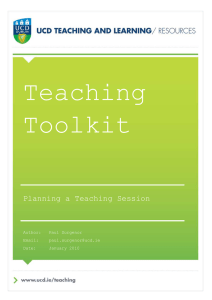


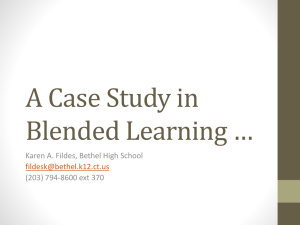
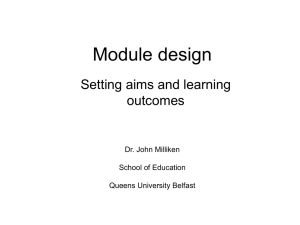
![Post Graduate Education []](http://s3.studylib.net/store/data/006803494_1-b6447e367782270079f2dcab263e0d3b-300x300.png)
